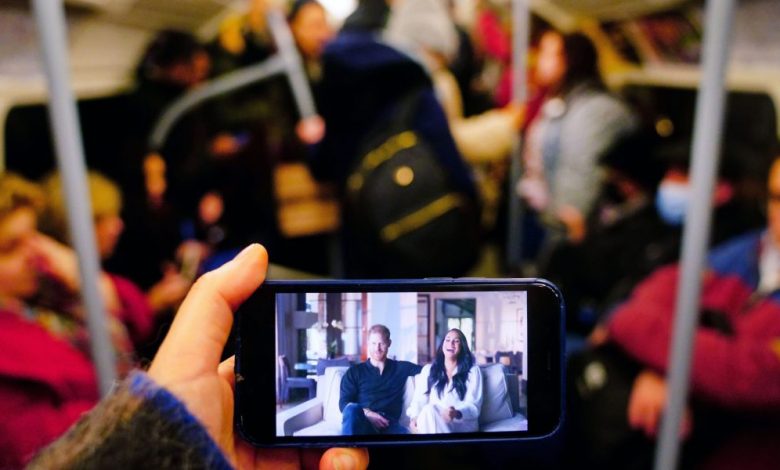Meghan Markle’s real sin the British public can’t forgive – and Americans can’t understand

A year in my job as wealthAs the comment editor of , I never expected that of all the things I look back on, royal news would be front and center. Yet here I am, and here we are, with more drama between the Windsors and the Sussexes. But we all have to be careful: this is a big business story, a big race relations story, and a big Transatlantic Alliance story.
While the American public has largely viewed the aftermath of Prince Harry and Meghan Markle’s new Netflix docuseries through the lens of race, many Brits have flatly dismissed the racism allegations leveled at the royal family. Both sides are partially right — and the way they’re both wrong reveals the cracks in the ‘special relationship’. As a recently naturalized Egyptian-British public opinion expert whose job consists primarily of editing op-eds by American entrepreneurs, academics, and business leaders, I’m here to illuminate what gets lost in translation.
Rationing instead of reform
wealthThe contributors and readers of are primarily interested in diverse but broad topics: keeping the American dream alive, the future of capitalism, and ways to change the world.
In my eight years living in the UK, another, very British dream has dominated the public debate: Brexit. As this saga continued, the talk turned to keeping calm and moving on in the most British way imaginable amid fiscal austerity.
Business concerns about Brexit were dismissed early on. COVID dealt a second blow to post-Brexit optimism, but former Prime Minister Boris Johnson summoned the “lightning bolt” of the British people.
Concerns about falling living standards were also dismissed as the nation became obsessed with how to make a dime and the media peddled tips and tricks on how not to freeze to death in your (very expensive) home.
Can by can (or can by can) and one extra layer of warm clothing at a time, we can all pull it off—just like during the Blitz.
accept his lot
From conservative commentators to everyday folks on phone radio shows and social media, the central thesis has been constant: people have it a lot worse than Meghan Markle. How dare she complain?
It’s not about race, they argued, it’s Meghan’s attitude that’s problematic.
British journalist and media diversity expert Marcus Ryder, who occasionally graces Fortune’s comments section with his insights, defines it as the difference between diversity and inclusion: Meghan’s presence can be accepted – but not her values.
This observation holds true regardless of geography. That’s why high-performing minority employees often fail or retire after working so hard to get into the space at reputable organizations.
But what exactly is the British public denying?
Concerned radio listeners and TV pundits in the UK were crystal clear: Markle is making a fuss – and many people are faring much worse in these difficult times. She should just accept her lot in life (objectively better than the rest of the world) and move on.
On the other hand, emotional tributes to Harry’s grandmother, Her late Majesty Queen Elizabeth II, invariably paid tribute to the monarch’s life of service, sense of duty and lack of self-pity.
Prominent political editor Andrew Marr best described the ideological roots of this approach in a column written weeks before the Queen’s death.
According to Marr, the queen was “a survivor of previous modes of existence. British culture, like other European and Asian cultures, has long been based on the subservience of the individual character to the required role or task. People were born to be farmers or leatherworkers, mothers, shopkeepers, clerks or priests. Until modern times this was a caste society. The good life was a life in which you fulfilled the duties and tasks that were assigned to you…”
If these are qualities, Americans certainly lack them. The pursuit of happiness is a constitutional right on one side of the Atlantic – and essentially a crime against God and society on the other.
And while the British Empire undeniably had a dark history, Britain today is a radically – and racially – different society.
This explains how a Hindu named Rishi Sunak reached No. 10 – grasping the class system at a very early age, as seen in a now famous video of a teenage Sunak declaring that he had no “working-class friends.” Has .”
Perhaps this is the most chilling thought for the British public about Harry and Meghan’s whole predicament.
If the Sussexes can challenge the privileged position they’ve been accorded, what about us? Does that mean we all have to speak up now? Oh god, no. The mere awkwardness would be unbearable – and Britain’s nurses, postal workers and railway unions are already getting ideas as we head towards an unhappy Christmas.
Put your head down, do as you’re told, and move on! And if the economy continues to falter, we’ll build shifts and take some cuts – just like we did during the Blitz.
Mohamed El Aassar is Fortune’s comment editor.
The opinions expressed in Fortune.com comments are solely the views of their authors and do not necessarily reflect the opinions and beliefs of wealth.
More must-read comments posted by wealth:
Our new weekly Impact Report newsletter explores how ESG news and trends are shaping the roles and responsibilities of today’s leaders. Subscribe here.



